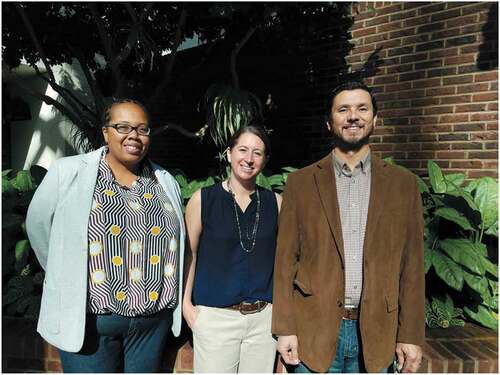
As we start to close out 2021, the year we all naively hoped would bring about the end of the COVID-19 pandemic, we want to begin by acknowledging the scope of the challenges as well as the many successes that middle grade educators and learners have shared these past 18+ months. The reality is that the ebb and flow of a usual school year will continue to be disrupted as schools and classrooms need to close, students and educators quarantine, and many suffer the health impacts of the virus. Yet what educators and learners continue to accomplish, despite this myriad of obstacles, is nothing short of miraculous. It is in acknowledgment of these accomplishments that we share our thoughts on the learning loss narrative that continues to negatively impact how we think about schools, learning, and most importantly, the young adolescents and families that we serve as middle-level educators.
One problematic component of the learning loss narrative is that it centers traditional academic teaching, which has been happening inconsistently as a result of COVID-19 mitigation and prevention efforts. This narrow definition of learning held by those who subscribe to the learning loss narrative lives on from the educational accountability era of No Child Behind and other legislative mandates of the 1990s and 2000s, including Race to the Top. When learning is defined as gaining specific pieces of knowledge and skills at a certain time, one could make the case for a loss of learning for many over these past 18+ months. But is that really how we want to define learning as middle grade educators and even as a society? We already know that all young adolescents grow, develop, and learn at vastly different rates, making the expectation for them to gain certain knowledge and skills by predetermined times flawed in its logic, and contrary to the ample research that grounds AMLE’s landmark position paper, The Successful Middle School: This We Believe. (Bishop & Harrison, Citation2021).
Like many educational fads, we fear that this learning loss narrative will be disproportionately applied to individuals with historically marginalized identities, serving as another way to center deficit ways of thinking about youth. “Historically, the (non) acceptance of minorities, especially [youth] of mixed heritage, has been rather hegemonic” (Hurd, Citation2019). For example, the struggle for Emergent Bilinguals to learn English as another language is exacerbated by the pandemic, due to language loss and families having to provide services at home (Radford et al., Citation2020). But to point blame at the pandemic or even parents, and to chalk-up so-called language and achievement gaps to learning loss, is just one part of the problem with the narrative. The struggle for schools to meet the needs of marginalized and migrant families during the pandemic existed long before remote learning. And this has become even more obvious with the return to face-to-face instruction.
The focus on loss in this context also undermines the real-life altering losses that have occurred as a result of the COVID-19 virus. Young adolescents across the world have lost grandparents, parents, uncles, aunts, cousins, siblings, mentors, and neighbors. Within their families, there have been lost jobs, homes, access to necessities, such as quality health care and food, as well as an overall sense of purpose. These are the losses that we should be focusing on as these are the ones that have major implications for how young adolescents are showing up physically and emotionally as members of our learning communities. Instead of a focus on the need to teach more content, how might we instead center the need to teach with greater compassion and empathy, focusing on the knowledge and skills needed for young adolescents to feel safe and secure during this time of constant anxiety and uncertainty?
As we end 2021, let us not forget what our students have learned during these unprecedented times. Over the past few months, I have observed my 10-year old go from boredom to building elaborate sculptures and contraptions out of found materials in our home when she would have otherwise been in school. Likewise I have witnessed my 14-year old, both expand his friend group and become more connected with peers as they learned to bike miles to gather in open outdoor spaces, build their own mountain bike trails, and construct a 3-walled building with a roof and fire pit. If we stop and pay attention, letting go of the need to define what constitutes valuable learning and relinquishing control of when and how young adolescents learn, we will see just how much they have learned and the many ways they have grown over these past 18+ months. Did my son enter high school this year knowing fewer academic facts and having read fewer books than he would have in different times? Absolutely. Did my daughter enter middle school this fall without some of the basic skills we would have expected in other times? Undoubtedly. Am I worried about their futures? No, and I acknowledge that there is considerable privilege inherent within that reality.
I choose to celebrate the myriad of amazing ways that my kids have shown up to support themselves, one another, our family, and their community at a time when that needed to be the priority. We hope you take the time to ask your learners to reflect on and share stories about what they have learned and how they have grown since the start of the pandemic. I think their answers will serve as an important reminder of what learning is and how it can happen anywhere.
References
- Bishop, P. A., & Harrison, L. M. (2021). The successful middle school: This we believe. Association for Middle Level Education.
- Hurd, E. (2019). The reflexivity of pain and privilege: Auto-ethnographic collections of mixed identity. Brill | Sense Publishers. https://brill.com/view/title/54415
- Radford, M., Suarez, N., & Silva, D. (2020, August 12). Remote learning a major challenge for students learning English as a second language. NBC Universal. https://www.nbcnews.com/news/latino/remote-learning-major-challenge-students-learning-english-second-language-n1236532
